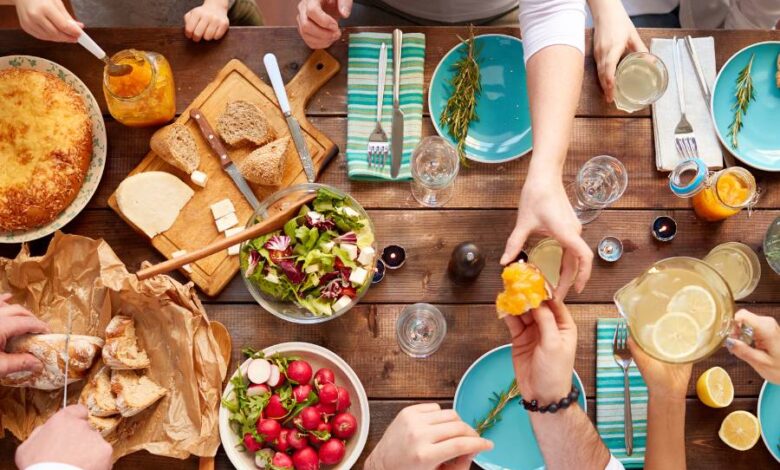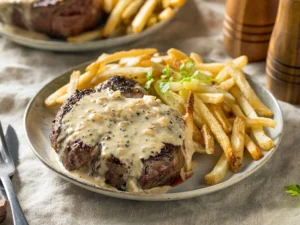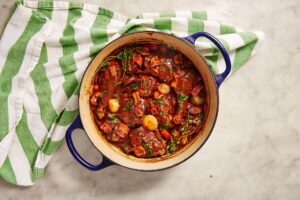best foods in French

On March 21, the French cuisine festival “Taste of France” was held in dozens of countries around the world. From Russia, 15 cities and more than 60 restaurants took part in it. TASS talks about how French cuisine became one of the best in the world and why Russia has a special attitude towards it
Festival
“If you want to win over a Frenchman and maintain a conversation with him, talk about French cuisine!” – this advice is often given by guides to tourists who come to France for the first time.
I look at the concentrated face of Nicolas Bohmann, like that of a jeweler, and I understand that now it would be better not to pester him with conversations – neither about the kitchen, nor about anything else, but he didn’t have any other time, I had to meet in the kitchen until he works.
Nicolas Bomann is the chef of the famous Parisian restaurant Maison Rostang, awarded two stars in the Michelin guide. I came to Moscow for just a few days to attend the world gastronomic festival “Taste of France”: on March 21, within its framework, three thousand participating restaurants in different countries of the world offered their guests dishes of French cuisine. But Bomann was invited to the capital with a special mission – to create a menu for a gala reception at the residence of the French Ambassador to Russia Sylvie Bermann, who that evening expressed support for the festival.
On the table in front of Nicolas are not at all exotic products: a huge bowl of finely chopped leeks, a bottle of olive oil, eggs, a package of heavy cream, a jug of white wine, a fillet of white fish and a bowl of Black Sea mussels. The chef is going to turn this simple set into a dish worthy of a Michelin star – a kind of “Olympic medal” in the art of gastronomy.

Alchemy in a saucepan
“If you come to my homeland and decide to try our “les moules marinières” (mussels cooked in wine, saffron or cream sauce – author’s note), then you will be served exactly this,” says Bomann, tipping a basin into a spacious pan raw mussels.
Then he pours them with white wine (“Just don’t be fanatical, the simplest white will do, the main thing is that it’s dry,” explains Nicolas.), adds a couple of cloves of garlic and a sprig of fresh thyme. After a few minutes, the wine begins to gurgle, and the air is filled with the aroma of a seaside tavern, so strong that it seems that tables covered with checkered tablecloths, noisy tanned customers and splashing waves are about to materialize from it.
But Bohmann has completely different plans for this seemingly complete, wonderful dish. Haute cuisine probably begins at this moment – when something tasty but familiar is turned into something completely unfamiliar. It turns out that mussels can be cleaned, chopped with a knife, beaten with stewed onions, cream, eggs and put in the oven, turning into a soufflé; from the evaporated wine in which the mussels were boiled.
prepare a sauce with a delicious caviar taste, lay out a striped mat from multi-colored boiled pasta, wrap the soufflé in it, bake, serve with fried white fish… I look at the plate pushed towards me by Bomann, then I carefully break off a piece of the gastronomic structure with a fork and try it. I look at the cook with a slightly clouded look of pleasure and see him smiling.
“Madame Ambassador herself chose this dish from those offered,” says Bomann, “for the reception I need to make more than a hundred servings.” A very meditative activity.”
Philosophy, not food
This year the Goût de France (“Taste of France”) festival is taking place in Russia for the third time. 60 Russian restaurants from all over the country took part in it, including those with French chefs.
Jean-Luc Moll, chef of Brasserie MOST on Kuznetsky Most, is a fifth-generation chef from Bordeaux; he compiled the festival menu mainly from Russian products: in his dishes he uses Kamchatka crab, beef cheeks, and local potatoes.
“It is absolutely not necessary to prepare a dish of French cuisine from products brought from France,” explains Jean-Luc, “in Russia there is plenty to choose from.” I like the meat here. Excellent caviar, northern fish. During the season you can find excellent vegetables, fruits and berries here.”
There is another important principle – seasonality. Moll notes that it is best to choose those products that were grown a maximum of one hundred kilometers from the home where the person lives. Although, of course, freshness is only a prerequisite, but not the reason for the global success of French cuisine, otherwise it would hardly be included in the UNESCO World Cultural Intangible Heritage List.

Among hundreds of others, it is distinguished by its incredible diversity, sophistication, combination of textures, temperatures, and tastes. A simple example: if in other countries onions are either added to the broth, or eaten raw, or fried, then in France you can find dozens of options for preparing this vegetable. It is used to make soups, caramelize, bake, make mousse, deep-fry, and turn into sauces and creams.
“French cuisine had a very rich past, an amazing foundation, and this applies not only to the cooking techniques that the Gauls inherited from the Romans,” says the chef. — The French managed to adopt the very attitude towards food as a joy of life, the ability to enjoy food, a kind of epicureanism. With this approach, there is a special relationship with food.
Legacy of the French kings
The development of French cuisine was largely influenced by the fashion introduced by the French kings. It was at the court that chefs competed in the sophistication and sophistication of their dishes, and other European courts, including the Russian one, followed her, considering it prestigious to get a French chef into their service.
“This competition in extravagance also did not play a very good role; it led to the fact that French cuisine outside of France began to be perceived as something very complex, and sometimes incomprehensible. And in Russia this is very noticeable: people come to a restaurant and expect to be offered something twisted.
with a secret, with a surprise, something unrecognizable. And in this pursuit of complexity, attention to the product itself and its taste is lost,” says the chef. — Often, preparing a haute cuisine dish for a chef is comparable to dressing up a bride. The bride may be beautiful in herself, but at the wedding everyone’s attention is focused on what dress she is wearing.


